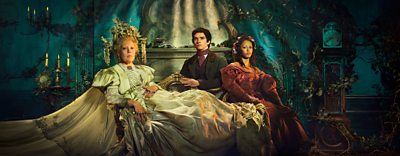Great Expectations is the coming-of-age story of Pip, an orphan who yearns for a greater lot in life, until a twist of fate and the evil machinations of the mysterious and eccentric Miss Havisham show him a dark world of possibilities. Under the great expectations placed upon him, Pip will have to work out the true cost of this new world and whether it will truly make him the man he wishes to be. A damning critique of the class system, Dickens’ novel was published in 1861 after first releasing it in a series of weekly chapters beginning in December 1860.
Steven Knight serves as writer and executive producer alongside Tom Hardy, Ridley Scott, Dean Baker, David W. Zucker, Kate Crowe and Tommy Bulfin for the BBC. Brady Hood and Samira Radsi serve as directors. Great Expectations is produced by FX Productions in association with the BBC, Scott Free and Hardy Son & Baker.
HW/MF3
Cast & Crew
Fionn Whitehead – Pip
Shalom Brune-Franklin – Estella
Olivia Colman – Miss Havisham
Ashley Thomas – Mr Jaggers
Johnny Harris – Magwitch
Hayley Squires – Mrs Sara Gargery
Owen McDonnell – Mr Joe Gargery
Laurie Ogden – Biddy
Matt Berry – Mr Pumblechook
Tom Sweet – Young Pip
Trystan Gravelle – Compeyson
Rudi Dharmalingam – Wemmick
Chloe Lea - Young Estella
Bronte Carmichael - Young Biddy
Steven Knight – Executive Producer & Writer
Dean Baker – Executive Producer
Kate Crowe – Executive Producer
Tom Hardy – Executive Producer
Ridley Scott – Executive Producer
David W. Zucker – Executive Producer
Tommy Bulfin – Executive Producer for the BBC
Mark Kinsella – Producer
Brady Hood – Director Episodes 1, 2, 3 & 4
Samira Radsi – Director Episodes 5 & 6
Dan Atherton – Director of Photography Episodes 1, 2, 3 & 4
Kate Reid – Director of Photography, Episodes 5 & 6
Sonja Klaus – Production Designer
Verity Hawkes – Costume Designer
Niamh Morrison – Hair & Make Up Designer
Interview with Steven Knight – Writer & Executive Producer
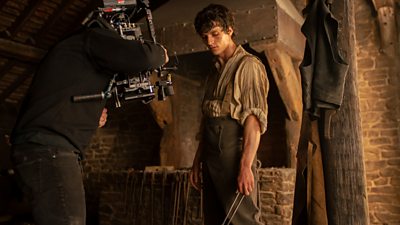
How do you balance staying true to the source material whilst also making it feel timely and modern?
I think that with any great writer like Dickens, the issues and the subjects that he deals with will always be timeless. They won’t be just of the time, they will be about the human condition. What I didn’t want to do – and I think Dickens never tried to do – was make something specifically political. He was never banging the drum, he was just saying ‘this is what’s going on’ and people could draw their own conclusions. You couldn’t write about certain things in Dickens’ time: certain elements of sexuality, crime, disobedience against the crown and state. What I tried to do was imagine if Dickens was writing the story now and had the freedom to go to those darker places, what would he do? If he had been liberated to write the things that were going on that he wasn’t allowed to write about.
Is there something specific you want the audience to take away?
There is always a core thought or point to anything that I write that is in the middle of it, but I try not to expose it too obviously. The reason I wanted to do it is because Pip is the son of a blacksmith, a farrier; and I’m the son of a blacksmith, a farrier. Pip is trying to escape from his background to change himself and become a gentleman, and that rings a bell with me personally. That rings a bell in England – the class system and whether you can ever leave the place where you were born or be accepted in a social class that’s different to yours. For me there is something personal about the scenes where he’s in the blacksmith’s shop collecting nails. I think things work best when you take a personal experience and find the bigger message.
Tell us about Ashley Thomas as Jaggers. Was the role of Jaggers always expanded when you were scripting the adaptation?
Jaggers always had increased screentime, so we needed someone who could really fill the screen, and that’s what Ashley does. He’s just so brilliant. Dickens creates these gifts of characters which are just meant for the screen. He writes screenplay dialogue; it’s phonetic, it’s real dialogue. Often with adaptations of anything from more than 100 years ago, people talk in a very controlled and stilted way, as if that’s how people really talked. But Jaggers is swaggering around, he’s a real person. It was important to have a character who is morally in the middle of things. He sort of represents London; survive or die. He seems ruthless and awful but he’s not.
Tell us about Fionn’s performance as Pip?
On many occasions he’s in a situation where you expect him to be an innocent from ‘the sticks’, coming into the sophisticated world, wide-eyed and overwhelmed. What Fionn did brilliantly was being wide-eyed and overwhelmed, but he isn’t going to let anybody know it! He’s got that way of being very arrogant and that he’s a man of the world. We all know he’s not, but he’s able to express that through the performance which is incredibly difficult because it’s like walking a tightrope. I think he did it so beautifully.
How did Olivia and her performance impact the role of Miss Havisham?
It was written as quite a big role anyway – obviously you’ve got to write it to get the actor – and she’s got to read pretty much beginning, middle and end. But when I knew it was Olivia obviously then you go back and start to enjoy yourself because you can start adding bit more of what Olivia brings. She’s just so powerful on the screen. There’s a couple of things we changed once we knew she would be in the role – a couple of what you’d call saucy lines where you know she’s going to pull it off in a way that it’s going to be just right. And she does.
What is your research process like for each Dickens adaptation?
I focus on the book primarily. But even before adapting Dickens I’ve always been really interested in 19th century London and the reality of it. So I try to reflect what was really going on. There are great books like Mayhew’s London which is a documentary book: somebody went walking in at night in London and wrote what he saw. It’s amazing. So, for me, the research is into what London was really like, put that as the canvas, and then lay the story on top of it. Dickens thinks like TV drama: cliff-hanger after cliff-hanger, plant something, reveal it a bit later, then reveal it wasn’t true. All of the things that you do when you’re writing a TV drama. I really feel the episodic nature of it.
What was the most difficult part of adapting Great Expectations? How did the process of creating it differ to adapting A Christmas Carol?
Well, A Christmas Carol is a short story, so it was more contained. So much is known as part of our culture with A Christmas Carol. You know, Scrooge dances on Christmas morning. You don’t want to be someone who comes along and says “right, I’m going to vandalise what you think of A Christmas Carol, I’m going to make it totally different and turn it all on its head.” I don’t think you should do that. So with Great Expectations, the scene with Magwitch on the heath is what people think of, so I wanted to keep that. I think A Christmas Carol was easier in a sense because there was a more simple map, whereas with Great Expectations there’s more freedom to play with those characters.
Does the freedom make it more difficult or more fun?
More fun. For me, writing becomes a chore when you know what you’re about to do. You think “I’ve got to do this and this in the next three scenes, so here we go.” I prefer to not really know where it’s going. You know it’s going in a certain direction, but you don’t know how you’re going to get there. That’s what makes it fun, the freedom to go in a different direction.
What was the most rewarding part of adapting Great Expectations?
Well I always say my favourite two words are ‘The End’. When you get to the end and it’s like: it’s an object now. That’s always good. But Jaggers and Miss Havisham are obviously two gigantic characters from a gigantic intellect and it’s amazing when you’ve got those characters to play with.
What are some of your favourite scenes from Great Expectations?
I like any of the scenes with Miss Havisham, Estella and Pip when he’s being educated. I think they’re just great.
How did you collaborate with Verity and Sonja on the set and costumes?
We had some of the best designers around. When I’m writing a script, I tend to do quite a lot of direction about what the room or scene looks like. But that’s just the beginning because then the designer comes in and looks at what’s contemporary and what was really going on at the time. I go to the set and think “this is amazing” because they do such a good job.
Interview with Fionn Whitehead (Pip)
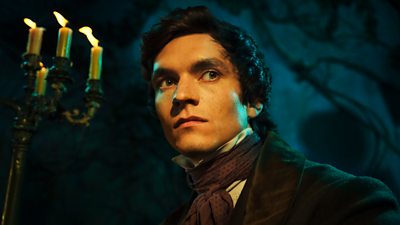
Can you tell us about Pip and the journey he goes on in Great Expectations?
When we meet Pip he's quite young and he is a very enthusiastic, excited kid in a lot of ways, although also quite unsatisfied. He's unsatisfied with where he is, what he's been born into and has these aspirations for travelling the world, seeing the Empire, going to Cairo to become a gentleman and escaping the situation he's in, which is not a particularly happy one at home. He lives with his sister and her husband – they’re a slightly dysfunctional family. I think he's a character who's possibly going through a lot of grief as well, like the death of other family members years before. As the story goes on, it's just him trying to shake that off and trying to become his own person and make his way in London.
Can you tell us about the relationship between Pip and Miss Havisham and what it's been like working with Olivia Colman?
Pip is pretty scared of Miss Havisham at first. She's an intimidating figure to him. He wants to learn from her and recognises that she is his only way into a world that he otherwise wouldn’t have access to. So, he bears her so that he can get as much information out of her, but is also really wary of her. When you see Olivia done up as Miss Havisham she is such an intimidating character, completely opposite to Olivia in real life, who is unbelievably lovely, kind and hilarious. I've had such an amazing time working with her.
How has it been working alongside Shalom Brune-Franklin?
Pip is kind of obsessed with Shalom’s character even though she is quite intimidating, harsh and cold with him. This couldn't be further from the truth in real life. Shalom is a brilliant actor and so kind; we get on really well and have a real laugh in between takes. It’s been great to be able to switch in and out of that because it would be exhausting to be really cold with each other the whole time, but we've been able to have a really good time.
What’s the dynamic like between Pip, Magwitch & Jaggers?
The dynamic between Pip and Jaggers is like an abusive relationship. Pip does everything Jaggers says and commits all kinds of terrible acts for and with Jaggers because he thinks that this is what he should do to become a gentleman. But, as it goes on, he starts to draw out the humanity in Jaggers and see that he's not as clear cut as he first appears. He's not just evil and, actually, some of the things he does he does for reasons that he tries not to let onto anyone, and I think that Pip breaks through some of that. With Magwitch, Pip doesn't really have very much to do with him. He's a very influential figure in his early life and I think that really affects him. That initial interaction really affects him throughout his life. I think it shakes him up because it's the first time he's experienced anyone who is completely out of his world, who is nothing to do with his village or where he's from.
Tell us about a moment that made you laugh on set?
We shot in Drummle’s office for about a week and we didn't really leave the building or room for that time. One of the days I was getting hysterical and couldn't stop laughing. There was a shot of Wemmick, played by Rudi, who is naturally hilarious, and all he had to do was spread butter on a piece of toast… But the intense eye contact he was making with me, while spreading the butter was just killing me and I just couldn't keep it together. I think I laughed for a solid 20 minutes.
Interview with Olivia Colman (Miss Havisham)
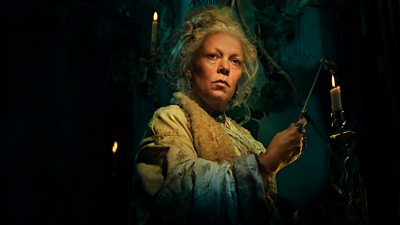
What were your first impressions of reading Steven Knight's script?
The first time I read Steven Knight's script, I thought it was much darker than what I had remembered from school. Quite a few bottom slapping moments, which I did not recall from the original Dickens! There were quite a few changes and I found it quite gripping.
What was it about Steven’s work that attracted you?
I worked with Steven previously on Locke, but I don’t think that matters really. I just always like a good script and he has written it very well. That for me is always the most important thing.
Can you tell us about Miss Havisham?
Miss Havisham is a woman who was madly in love with someone; she went to get married and he never turned up. Her life stopped from that moment, pretty much. She is only really in her forties, but she is always depicted as a much older woman. We have gone for long white hair and lots of broken veins. We think she went white with the shock and the heartbreak. In this version she is an opium addict, so she has had a bit of a life – indoors, no sunshine. She adopts a baby, Estella who she sort of trains to be an assassin in a way; to hurt men as much as she was hurt.
What games does she play with Pip and Estella?
She is using Pip as a guinea pig for Estella. Teaching him how to be a gentleman but sort of mocking him. She wants him to fall in love with Estella, so that she can break his heart. She can then, bit by bit, payback men.
How was it working with Fionn and Shalom?
I worked most of the time with Fionn and Shalom – they are irritatingly young and beautiful, and really good! I have had a lovely time, and I sort of forget I’m not the same age as them. Then I look in the mirror and go "oh yes, they have given me a great white wig." It’s amazing working with them, they are brilliant. It is very exciting to see where they will go.
What was it like working with Johnny Harris?
We were so excited to meet each other! He was in makeup and I went in and went "hello" and he went "oh!" He got his earbud and I think he put it up his nose, he didn’t know what to do! We had heard so much about each other, from mutual friends, so working with him was so exciting. He is a proper, proper actor.
Can you talk about Verity Hawkes and the costume department that brought this to life?
Verity Hawkes and her costume department are basically my way in to Miss Havisham. The first time I tried on Verity's costume, she said "I don’t want it dusty and old, I want it rotten. I think Miss Havisham is darker than that, she is rotten on the inside." It was so great, and the dress is sort of rotting. You know when you see a lemon left in the fruit bowl, and it has gone those beautiful shades of green. The decay is growing up the dress, it’s amazing.
What was it like stepping on set and seeing Sonja Klaus' work on the crumbling estate?
I had all my gear on and the first time I stepped into the ballroom, it was the first set I saw – it is just incredible. The way that the mould is taking over the dress, and the way the outside is coming in. Miss Havisham says "the outside has invited itself in” about a tree that falls through the window, but there are vines and things, and they are becoming stuck in this world. It is so beautiful what she has created, it is really amazing.
Does this feel like a different Miss Havisham?
They’re all a little bit different, are they not? I was given a stick and I ended up using it more as a fashion thing, rather than playing her as needing it. There might have been a couple of scenes where I forgot that, but don’t tell anyone! I think she’s vain and her ego is massively bruised – everybody plays it in a different way. That’s part of the fun. Every Shakespeare character is played slightly different by everybody who plays it, so we will see.
Interview with Shalom Brune-Franklin (Estella)
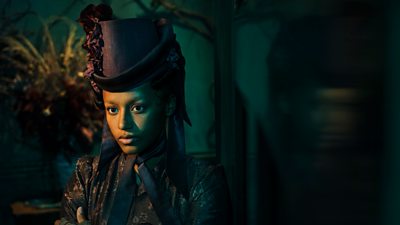
What do you think it is about this classic tale that makes it so captivating for readers?
What makes this story such a timeless tale is that it’s somebody who’s desperate to be something other than themselves. I think, at some point, everyone has gone through that. Or desperately wanting to climb the social or class ranks to be richer than they are. There's something in that for everyone to relate to at some point in their life.
Can you tell us about your character, Estella, and the journey she goes on?
Estella is Miss Havisham's adopted daughter. Miss Havisham was famously left at the altar and, since then, she's lived this incredibly heartbroken life. She adopts this child and her real aim is to raise a daughter who can break the hearts of men. It's sort of her way of getting revenge on the opposite sex for what happened to her. Estella is like Miss Havisham's doll in an incredibly toxic environment. She’s raised to be a cruel and cold heartbreaker and that's the beginning of the journey that we see in the show.
What was it like working with Olivia?
It was amazing. The relationship between Estella and Miss Havisham is incredibly toxic and dark, especially the way that Steven has adapted it. I was really excited and nervous when I found out Olivia Colman was essentially going to be playing my mum. They're such heavy scenes so it's really fun when we're on set and straight after we yell "cut" we're just laughing and making light of the situation, so that's been lovely. She's such a dream, I literally pinch myself thinking about it. I can't believe I'm working with her.
Can you tell us about Steven Knight's writing?
Steven Knight is amazing. I was such a huge fan of his. As soon as I saw this audition fall into my inbox I was like, oh my gosh, I couldn't breathe. He's incredible. The adaptation is so different and exciting. There are so many characters that I feel are different from the book. One of my favourite characters in our version is Jaggers, who I think is almost unrecognisable from the novel. He's got an incredible imagination and it's going to be really good fun to watch.
Could you talk about the look for your character?
The process of hair, makeup and wardrobe with a period drama is so different to anything I've ever experienced, specifically with wardrobe. In our very first meeting with Verity Hawkes, who's the designer, she'd laid out all these incredible sketches that she had drawn up and was explaining the process of what happens to Estella – we see her bloom and rot in her clothing, like you would with flowers. I remember going in for those first fittings and seeing those dresses for the first time – they literally took my breath away.
So, how would you describe Estella's fashion and style?
It’s obviously incredibly period, like Victorian, but I think Verity and Niamh Morrison, the hair and makeup designer, both had, surprisingly, a lot of fashion runway references. There were Galliano references, Vivienne Westwood references. So, they were trying to go for something that was a bit more editorial and grungy, not quite traditional. I guess I would describe her style as a weird rotting grunge princess.
Have there been any funny moments on set?
There’s been some pretty funny things that have happened with the horses on set. They really do have amazing timing when it comes to dropping a fart or deciding to pee or poo themselves in the middle of the scene. It’s not very highbrow that answer, is it? It's so loud. It sounds like some kind of like heavy machinery, a horse fart.
Interview with Ashley Thomas (Mr Jaggers)
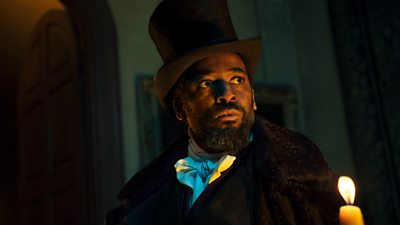
Do you remember the first time you read the story and the impact it had on you?
Being honest, the first time I heard of Great Expectations properly was just in passing. However, the first time I dived into it was when I took on the role of Mr Jaggers. I had always wanted to get involved in this era and I felt like this was the right chance to do it. I did some Dickens in secondary school actually, we did Oliver Twist. I played the Artful Dodger and there are some old pictures of me. It’s me with the top hat and the tail coat when I'm like 15 years old. So it’s cool to transition into this time as an adult and dive into the world of Dickens.
Tell us about working with Fionn?
Working with Fionn Whitehead has been very interesting. He is a really talented actor and we have been getting along on set. He likes to play his music from his little speaker and I love music as well. We have been really catching a vibe and laughing, making jokes and just enjoying each other’s company. I think that rings through on screen. Even though, at first, the characters are at odds, they come together and get closer and our relationship off screen starts to show on screen. There is a comfortability between us that is shining through.
What is different about this interpretation?
What makes this version different is the casting choices – they have really thought outside of the box. People can see themselves in a piece like this where they may have been excluded previously just because of the nature of the way the world was at the time. London at that time was a melting pot of different cultures. You had people from Asia, Africa, and the Caribbean, even before the Windrush era. I think it is important that these shows show that representation. I don’t think it’s about being woke, it’s just about being accurate to the time. This team have really endeavoured to make that happen.
Even in the book, Jaggers is described as a burly man and of exceedingly dark complexion, so it’s interesting the casting choice that they have gone with on this occasion.Representation is key and that’s across the board, whether that’s where someone is from, their sexual orientation, or religious background. It’s more true to life and better for the authenticity of projects. I don’t think we should shy away from that. We should embrace it where we can, where possible, and where it makes sense.
Interview with Johnny Harris (Magwitch)
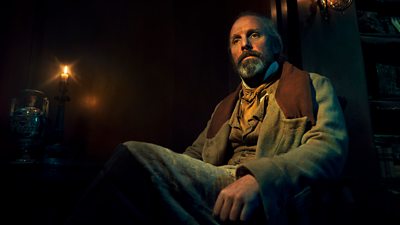
When I say Great Expectations, what are the first images that come into your head?
It’s kind of cheeky to say it because I'm playing Magwitch but it's the graveyard scene from the original movie. That haunting image. And Miss Havisham as well. The haunting image of this old lady who’s been jilted and resentful. That’s a powerful image.
How does this differ from previous versions of Great Expectations?
I think the casting is inspired. I was excited when I heard Ashley was going to be playing Jaggers – he’s mastered language as a rapper and is an incredible actor. As an actor you'd be lying if you didn't say that you're always intrigued as to who’s going to be the other cast members! I’m a massive fan of Olivia. It just works. When they said Olivia was going to play Miss Havisham I was like: they’ve nailed that. Sometimes adaptations can be a bit dusty and old, but I think Steven's was unashamedly modern.
Can you tell us a bit about Magwitch?
It's hard to describe him really because he goes on a journey. It depends which Magwitch you're talking about, you know, he's quite different at the beginning to the end. Magwitch is a troubled man. On the surface, he's a convict, a rogue, a highwayman, a legend of the road, and he's lived the life of sin. We meet him when the repercussions of that are in full swing. Then there’s an awakening, and from there on he's someone who is trying to do the right thing in life.
How much of a thrill has it been to put your stamp on such an iconic character?
It’s humbling, there's no doubt about it. I'm from the Elephant and Castle, that's where I grew up and where I live now, and it's where this is all set. There was a great line in one of the earlier drafts, where Jaggers sends Pip off to South London and says, "Take this letter to the Walworth Road." Pip says, "What if anyone stops me?" And he says, "Don't talk to anyone within two miles of the Elephant and Castle, they're not to be trusted," and I just laughed. That's where I'm from, I live on the Walworth Road. I really wanted to tell, for what it's worth, my interpretation of who Magwitch is.
You said you had to lose weight for the role?
Yes, we were laughing when I took the role on! I was quite overweight and there was potentially a naked scene where we'd see Magwitch's body, and he's very strong and hungry – famished – on the run in shackles and he hasn't eaten, so I needed to lose weight for sure, and ideally I would have put some muscle on as well. I lost 22 lbs – it's a lot of weight to lose. I didn't know I had that on me if I'm honest, but it came off, and so to do that it was a very strict diet. It's not easy, at my age, I love my puddings and desserts. So the diet finished and I said I never want to see another piece of broccoli again. And then we came to Pinewood Studios, in the water tank, and to make it look like the Thames, they put like a silt in it and fill it with broken broccoli. I probably ate more broccoli that day than in the previous four month of the shoots! So now I officially don't ever want to see another piece of broccoli as long as I live. I'm done with that stuff.
What was it like working with Olivia Colman?
Olivia's incredible. I came off Twitter because of Olivia Colman. Maybe I shouldn't tell this story but she gave a performance in a film called Tyrannosaur that is up there with the greatest performances of all time by anyone, anywhere, ever, and she didn't get a BAFTA nomination. I'd always promised myself that I would never get political on Twitter, and all of a sudden I'm publicly declaring, that they should be ashamed of themselves for not nominating this performance. And then I thought, I've got to come off it. So Olivia Colman is the reason I came off Twitter. I'd never met her, I was just kind of outraged at her not getting nominated for that performance.
But anyway, I digress. Look, it's Olivia Colman. I could have acted with her all year and I would never have got bored. I think she's lovely and she's a beautiful soul as well, a very kind woman. The first day I worked with her, I'm not saying this for the purpose of the cameras, I've told a few people this, but I bounced out of bed the next day. I couldn't wait to get in and start work with her, and that's a lovely thing to happen.
Interview with Trystan Gravelle (Compeyson)
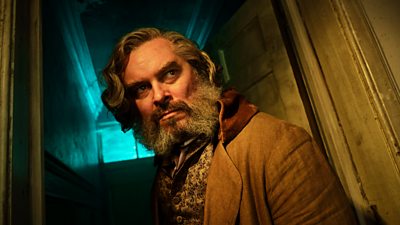
What impact does Compeyson have on Pip’s journey?
We first see Compeyson in Pip's life on the marshes. He's just escaped the hulk, and he and Pip stumble across each other--there's some distance between them--and Pip knows that there's something wrong with this person, something quite insidious and malevolent, and decides not to approach him, but Compeyson, being the charmer that he is, thinks he can talk anybody round, thinks he can get close enough to silence him, because Magwitch is on the marshes looking for Compeyson, and he doesn't want anything to thwart his escape. So the it's quite a horrible introduction for Pip to Compeyson.
What has it been like working with Olivia Colman?
Working with Olivia Colman was incredible. We had a couple of big scenes and she just made it effortless, very easy, very seamless. We had a laugh, and it was huge honour; it's a huge honour to be on this set with everybody. You feel incredibly blessed. Olivia is a national treasure. I have to point a gun at her at one point and I was very nervous about that, and I have to push around a little, and she's a national treasure, so if you harm Olivia you might as well ask Jeff Bezos for a trip to the moon, as there's no place here to hide.
Have there been any funny moments on set?
There was a moment that made me laugh, looking back: the first day of working with Johnny Harris, who is an incredible actor. I remember once accosting him on the Walworth Road a few years back, and he remembered, when I fan-boyed over him. Our first day was on the marsh, kicking hell out of each other. He's a tough, fit guy and there's a big fight where halfway through the first take I thought oh my god, I'm about to shed a kidney here, I can't keep up with this guy, he's such an incredibly fit person. I remember pushing him into the mud and I just saw his face disappear into this pool of mud, and I was so relieved, I pressed on his chest a bit longer than I should have and kept him in the mud, just to give myself some respite. I think trying to kill Johnny Harris on my first day is something of an anecdote.
Interview with Kate Crowe & Dean Baker (Executive Producers)
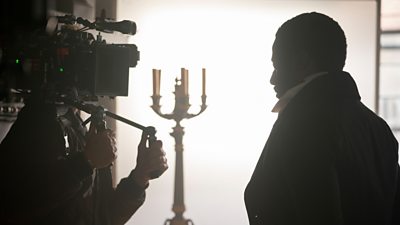
Why was Great Expectations a story that you wanted to tell?
DB: We spoke about doing Oliver Twist or A Tale of Two Cities, but ultimately we settled on doing this as a second Dickens. I think partly because it feels so relevant today.
KC: It really taps into themes that are there in Steve's writing in his other works. He looks at things like class and social mobility and, in this version, the time that it's set, the way that empire and commerce has affected and shaped London, for example, are all things that very much interest Steve.
DB: Steve was the son of a blacksmith so I think it has a special relevance to him. He's such a fan of Dickens and then coming from that world there are parallels between him and Pip.
How does this version differ from versions we've seen before?
KC: It starts off faithfully with young Pip and the famous meeting in the graveyard. And really it's from episode two onwards you start to feel Steve's take on the material. He’s a huge, huge Dickens fan and what he can do is look at the story with the benefit of hindsight. We've seen massive changes that post-date Dickens who was writing towards the end of the Industrial Revolution and was interested in the way that society changes and the way people are able to leave and move on or not and Steve examines all that but from a modern standpoint.
DB: Steve does these a forensic reads of the text and he tries to interpret what he thinks Dickens would write if he was writing that novel now. So it's definitely a fresh and bold approach.
What does Fionn bring to the role of Pip?
KC: He brought a real authenticity and honesty to the part and you really feel for Pip and his journey through London and his eventual downfall. It really hits hard. He's a terrific actor.
Tell us about Miss Havisham and what Olivia what brings to the role?
KC: Steve’s version of Miss Havisham is not a gothic masterpiece stuffed away in a dusty room. She is very human and very flawed. Olivia’s performance captures all this, she’s cruel, funny, witty, vulnerable. It’s a brilliant performance, of course.
DB: Steve examines her mental illness in a way that's never really been done before, it feels so much more truthful. She is obviously a fragile character to begin with but then when she was left at the altar it had a profound impact on the course of her life.
Can you speak about Shalom Brune-Franklin as Estella?
DB: I think Shalom is hugely talented. It was so exciting for us to work with her. I think what she brings to the role is a truthfulness. She’s just astoundingly good in the scenes she has with Olivia Colman.
Can you tell us about Ashley Thomas' Jaggers?
DB: To have an actor like Ashley play such a powerful role in a period drama just feels very exciting and it's something we haven't really seen before.
Tell us about the collaboration between directors Brady Hood and Samira Radsi?
DB: I've known Brady for several years and it was really exciting to finally get a production away with him. When Brady came to us with his vision for it was just really it felt so personal to him. He’s bought an enormous depth to the story and a personal insight – and he's a really lovely human being.
KC: We were aware of Samira from her work on Deutschland 83 and it was fantastic to have a female viewpoint for the last two episodes. And also because Samira is not British, having somebody else look at the British class system at that time was very interesting.
Can you talk about the partnership with Tom Hardy and Ridley Scott?
KC: Obviously Ridley is an icon of cinema so having his input and his lens on things is always really invaluable.
DB: It was great to have Ridley read the scripts and get his thoughts, as well as being across the casting and director selection. It’s a privilege to have both Ridley and Tom as part of our creative team.
Are there any other stories you'd like to explore with them?
DB: Currently we are working on a second season of Taboo, and hopefully we will get to explore more Dickens with Steve, Ridley and Tom.
How important is the relationship with FX and the BBC?
DB: We were extremely lucky to have FX and BBC as creative partners on both Great Expectations and a Christmas Carol. Both FX and the BBC at all times have been nothing but hugely passionate, supportive and excited about the show.
